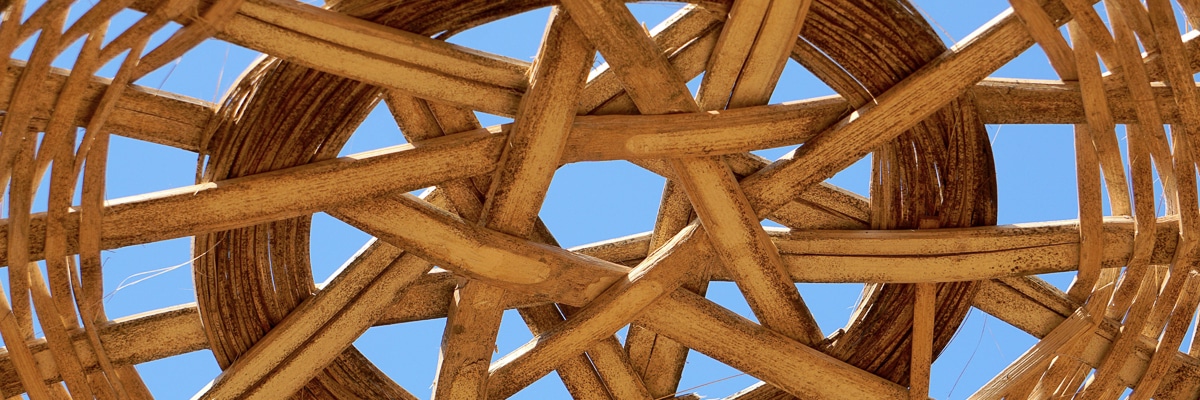
Father Richard Rohr reflects on the painful consequences of feeling disconnected from God, self, one another, and the earth. Understanding the Trinity as the source of reality’s interconnectedness leads to healing:
I’m convinced that beneath the ugly manifestations of our present evils—political corruption, ecological devastation, warring against one another, hating each other based on race, gender, sexual orientation, religion, or nationality—the greatest dis-ease facing us right now is our profound and painful sense of disconnection. We feel disconnected from God, certainly, but also from ourselves (especially our bodies), from each other, and from our world. Our sense of this fourfold isolation is plunging humanity into increasingly destructive behavior and much mental distress.
Yet many are discovering that the Infinite Flow of the Trinity—and our practical, felt experience of this gift—offers the utterly grounded reconnection with God, with self, with others, and with our world that all spirituality, and arguably, even politics, aim for, but which conventional religion and politics fail to access.
Trinity overcomes the foundational philosophical problem of “the one and the many.” Serious seekers invariably wonder how things can be both deeply connected and yet clearly distinct. In the paradigm of Trinity, we have three autonomous “Persons,” as we call them, who are nevertheless in perfect communion, given and surrendered to each other with Infinite Love. With the endless diversity in creation, it’s clear that God is not at all committed to uniformity but instead desires unity—which is the great work of the Spirit—or diversity united by love. Uniformity is mere conformity and obedience to law and custom; whereas spiritual unity is that very diversity embraced and protected by an infinitely generous love. This is the problem that our politics and any superficial religion are still unable to resolve.
Trinity is all about relationship and connection. We know the Trinity through experiencing the Flow itself. The principle of one is lonely; the principle of two is oppositional and moves us toward preference and exclusion; the principle of three is inherently moving, dynamic, and generative. Trinity was made to order to undercut all dualistic thinking. Yet for all practical purposes, Christianity shelved it because our dualistic theologies could not process it.
God is not a being among other beings, but rather the Ground of Being itself which then flows through all beings. As Paul says to the intellectuals in Athens, this God “is not far from us, but is the one in whom we live and move and have our being” (Acts 17:27–28). The God whom Jesus reveals is presented as unhindered dialogue, a positive and inclusive flow, and a waterwheel of outpouring love that never stops! St. Bonaventure called God a “fountain fullness” of love. [1]
Nothing can stop the flow of divine love; we cannot undo the eternal pattern even by our worst sin. God is always winning, and God’s love will finally win in the end. Nothing humans can do will stop the relentless outpouring force that is the divine dance. Love does not lose, nor does God lose. That’s what it means to be God!
References:
[1] See Ilia Delio, The Emergent Christ: Exploring the Meaning of Catholic in an Evolutionary Universe (Maryknoll, NY: Orbis, 2011), 37, 163. Bonaventure’s phrase is fontalis plenitudo.
Adapted from Richard Rohr, Essential Teachings on Love, selected by Joelle Chase and Judy Traeger (Maryknoll, NY: Orbis Books, 2018), 118–119.
Image credit and inspiration: Georg Arthur Pflueger, Untitled (detail), 2022, photo, Germany, Unsplash. Click here to enlarge image. We are individual pieces in an intricately interconnected weave of reality; together we make a whole.
Story from Our Community:
Ever since I was introduced to Richard Rohr’s Daily Meditations, I’ve been moved toward a spirituality that I had been seeking all my life. After attending a CAC conference in Albuquerque, I began attending workshops and book study groups at a church nearby. I find it funny that after all these years, a wonderful support group was always there—right in my backyard. Next month, we will begin reading “Falling Upward” by Fr. Rohr, and I can’t wait. I’ve already read it, but this time I’m really looking forward to the deeper meaning that emerges from discussion with others.
—Kelly B.




